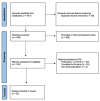Comparison between Different Groups of Vegetarianism and Its Associations with Body Composition: A Literature Review from 2015 to 2021
- PMID: 35565820
- PMCID: PMC9104728
- DOI: 10.3390/nu14091853
Comparison between Different Groups of Vegetarianism and Its Associations with Body Composition: A Literature Review from 2015 to 2021
Abstract
Background: Vegetarian and vegan diets have become increasingly popular in the last years for many reasons, including their association with various health benefits when compared to omnivorous diets. The main objective of the study was to collect recent (2015-2021) scientific evidence for potential implications between a vegetarian/vegan diet and an individuals' body composition.
Methods: A literature search was conducted in PubMed, with 22 studies selected for inclusion in our collective evaluation. Of the 22 studies included, there were 12 randomized controlled trials, 1 nonrandomized controlled trial, 1 comparative study, and 8 cross-sectional. The overall sample included in this study consists of 436,178 participants, 10,090 of whom were vegetarians, 5044 vegans, and 421,044 omnivores.
Results: Most studies, 17 out of 22, reported a significant positive relationship between a plant-based diet and body composition.
Conclusion: There is scientifically sound evidence that vegan or vegetarian diets are associated with weight and body mass index reduction and, in some cases, fat mass distribution changes.
Keywords: body composition; body mass index; literature review; vegan diet; vegetarian diet.
Conflict of interest statement
The authors declare no conflict of interest.
Figures


Similar articles
-
Is a vegan or a vegetarian diet associated with the microbiota composition in the gut? Results of a new cross-sectional study and systematic review.Crit Rev Food Sci Nutr. 2020;60(17):2990-3004. doi: 10.1080/10408398.2019.1676697. Epub 2019 Oct 21. Crit Rev Food Sci Nutr. 2020. PMID: 31631671
-
How Does Selenium Intake Differ among Children (1-3 Years) on Vegetarian, Vegan, and Omnivorous Diets? Results of the VeChi Diet Study.Nutrients. 2022 Dec 21;15(1):34. doi: 10.3390/nu15010034. Nutrients. 2022. PMID: 36615692 Free PMC article.
-
Growth, body composition, and cardiovascular and nutritional risk of 5- to 10-y-old children consuming vegetarian, vegan, or omnivore diets.Am J Clin Nutr. 2021 Jun 1;113(6):1565-1577. doi: 10.1093/ajcn/nqaa445. Am J Clin Nutr. 2021. PMID: 33740036 Free PMC article.
-
Vegetarians have a lower fasting insulin level and higher insulin sensitivity than matched omnivores: A cross-sectional study.Nutr Metab Cardiovasc Dis. 2019 May;29(5):467-473. doi: 10.1016/j.numecd.2019.01.012. Epub 2019 Feb 2. Nutr Metab Cardiovasc Dis. 2019. PMID: 30956029
-
Calcium intake in vegan and vegetarian diets: A systematic review and Meta-analysis.Crit Rev Food Sci Nutr. 2023;63(31):10659-10677. doi: 10.1080/10408398.2022.2084027. Epub 2022 Jun 6. Crit Rev Food Sci Nutr. 2023. PMID: 38054787
Cited by
-
A glimpse of academic staff health behavior on diet type and physical activity at Austrian universities: first findings from the "Sustainably Healthy - From Science 2 Highschool & University" study.Front Public Health. 2023 Jul 6;11:1194602. doi: 10.3389/fpubh.2023.1194602. eCollection 2023. Front Public Health. 2023. PMID: 37483946 Free PMC article. Review.
-
The Relevance of Plant-Based Diets and Micronutrient Supplementation for Body Composition: Data from the VeggieNutri Cross-Sectional Study.Nutrients. 2024 Sep 30;16(19):3322. doi: 10.3390/nu16193322. Nutrients. 2024. PMID: 39408288 Free PMC article.
-
The Association between Vegan Dietary Patterns and Physical Activity-A Cross-Sectional Online Survey.Nutrients. 2023 Apr 12;15(8):1847. doi: 10.3390/nu15081847. Nutrients. 2023. PMID: 37111067 Free PMC article.
-
Dietary Habits and Lifestyle, Including Cardiovascular Risk among Vegetarians and Omnivores during the COVID-19 Pandemic in the Polish Population.Nutrients. 2023 Jan 14;15(2):442. doi: 10.3390/nu15020442. Nutrients. 2023. PMID: 36678313 Free PMC article.
-
Bone mineral density and body composition in Australians following plant-based diets vs. regular meat diets.Front Nutr. 2024 Jun 21;11:1411003. doi: 10.3389/fnut.2024.1411003. eCollection 2024. Front Nutr. 2024. PMID: 38974811 Free PMC article.
References
-
- Pilis W., Stec K., Zych M., Pilis A. Health benefits and risk associated with adopting a vegetarian diet. Rocz. Państwowego Zakładu Hig. 2014;65:9–14. - PubMed
-
- Vanacore D., Messina G., Lama S., Bitti G., Ambrosio P., Tenore G., Messina A., Monda V., Zappavigna S., Boccellino M., et al. Effect of restriction vegan diet’s on muscle mass, oxidative status, and myocytes differentiation: A pilot study. J. Cell. Physiol. 2018;233:9345–9353. doi: 10.1002/jcp.26427. - DOI - PubMed
Publication types
MeSH terms
Grants and funding
LinkOut - more resources
Full Text Sources
Medical

